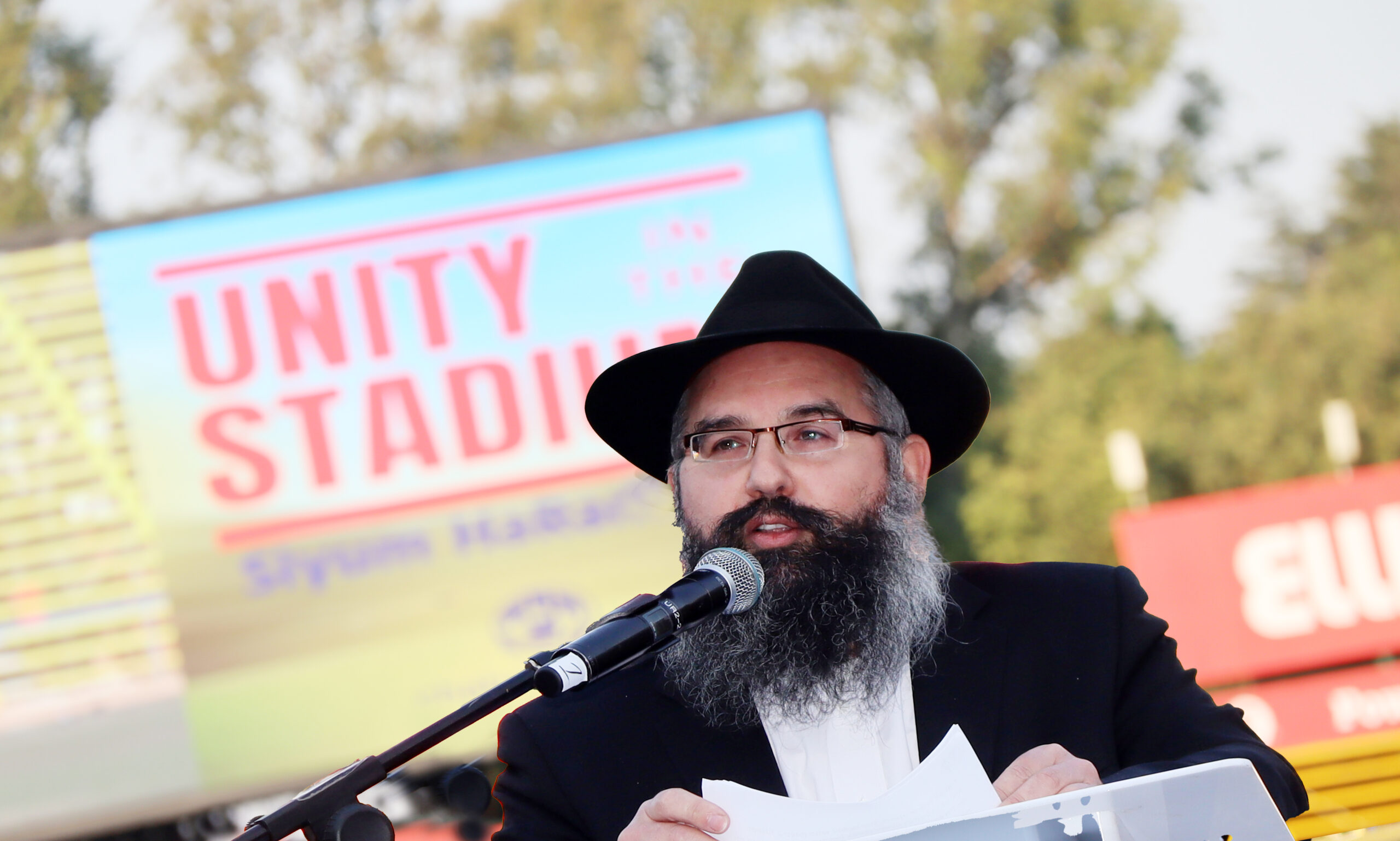
Community

Connectedness, community – Chabad’s plan to change the world
It happens once every seven years. Marking Hakhel, an auspicious time to assemble men, women, and children to encourage Torah observance and study, Chabad’s Unity in the Stadium event promoted solidarity, learning, and inspiration in a world often marred by fear and uncertainty.
“From the beginning, we realised quickly that we were in Hashem’s hands,” said Rabbi Yechiel Shlomo Levitansky, who travelled more than 48 hours from Sumy, Ukraine, to be at the event and share his inspiring story. “There’s not much that you can do when the Russian army is surrounding your city.” He and his South African born wife, Rochi, are Chabad shluchim (emissaries) in Sumy.
“For a long time, we were stuck in our city, the sound of gunshots, explosions, every day, every night, sometimes farther, sometimes closer,” said Levitansky. “All of these things were almost unbelievable; we couldn’t imagine that this was actually happening. But on that first day, after bringing the Sefer Torah scrolls from our shul to our basement in our home which serves as our bomb shelter till today, it started to sink in.”
Since then, he and his family have dedicated themselves to help their community whatever way they can, from near and from far. Along with millions of their countrymen, they initially fled Ukraine, seeking safety across the border where they were overwhelmed by the kindness of strangers, but they eventually returned to their home and community.
In discussing the lessons learnt along their harrowing journey, Levitansky put our country’s challenges in perspective. “So, there’s no electricity, but there’s water,” he said. “There’s no water, but there’s electricity. There’s no water and no electricity, but we still have a home and food. There’s no food, there’s no home, but we’re all together. There’s always a blessing. Focusing on what we do have instead of focusing on what we don’t helps us to be happy and to be thankful for what we have.”
Being thankful to Hashem was a theme of Unity in the Stadium at Wanderers on Sunday, 23 April. It also demonstrated the importance of coming together, studying Torah, and acting in the face of the world’s challenges in order to bring Moshiach (the messiah). The event also commemorated Siyum HaRambam, the completion of the annual Rambam (Maimonides’ code of Jewish law) study cycle.
Levitansky said the Jewish world’s prayers had been felt tangibly since the war broke out, giving rise to miracles within their community and amongst their non-Jewish neighbours. In recognising this and seeking connection, his shul’s numbers have increased exponentially. Though some have fled the country, many new members have come, some moving to Sumy from other Ukrainian cities, but most living nearby who have joined services for the first time, demonstrating the need for unity and prayer.
Along with master of ceremonies, former South African cricketer Mandy Yachad, and opened by Chief Rabbi Dr Warren Goldstein, the event featured other local and international speakers. These included Miracle Drive Chairperson Simon Kuper; Robbie Brozin, leading entrepreneur, and co-founder of Nando’s; and Michal Oshman, bestselling author and the head of company culture, diversity, and inclusion at TikTok Europe.
“We are like one person with one heart,” said Goldstein, who led attendees in reciting tehillim. “That’s what makes South African Jews so special – our unity. The power of Jewish unity is what Hakhel is all about.”
Kuper spoke of South Africa’s challenges and the frustrations that they evoke. Yet, he said, the solution is to do acts of kindness, as our community’s leaders teach us. Speaking of Chabad’s Be Kind campaign which features visible signage inspiring all who see it, Kuper said, “Being kind isn’t a message, it’s an action. Being bold with our actions can be a spiritual experience.”
Echoing the need for action, Brozin, quoted the preamble to our Constitution, which provides a “rule book” for us to all live together and promote human dignity. This, he said, together with the Rebbe’s words that “South Africa will be good for Jews until the coming of Moshiach” are what underpin his “hope and optimism” for the country in spite of our challenges. “As South Africans, we’re human beings first,” he said. “It’s up to us, our actions will change this country and develop it for our grandchildren and our grandchildren’s grandchildren.”
In a pre-recorded video message from the United Kingdom, Oshman, the author of What would you do if you weren’t afraid? spoke of the importance of working to connect to one’s community. “The world is facing a lot of uncertainty and many of us are afraid, overwhelmed, and unsure,” she said. “We’re trying new things and sometimes we get it right and sometimes we get it wrong. What helps us stay safe and what keeps us connected is our community, and the sense of belonging it brings.”
Shaun Matisonn, deputy chief executive at Vitality Global and the head of the Vitality network, stressed the fact that the Rambam is for everyone. Illustrating this idea, Grade 5 and 6 representatives of Torah Academy Primary School, who have mastered hundreds of laws and mitzvahs as explained by the Rambam, shared some of the lessons they’ve learnt.
“We had this event because the world is upside down,” Chabad House Johannesburg Director Rabbi David Masinter told the SA Jewish Report. “We need more unity and kindness to bring Moshiach.”










